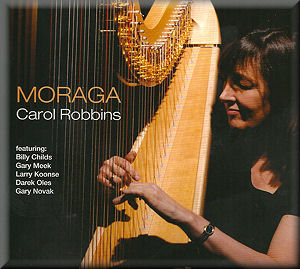1. Moraga
2. The Sand Rover
3. Three Rings
4. Dolore
5. Every Time We Say Goodbye
6. Hope In The Face Of Despair
7. Straight Away
8. Caminhos Cruzados
9. Rotadendron
Carol Robbins - Harp
Billy Childs - Piano
Gary Meek - Saxes, clarinet
Larry Koonse - Guitar
Darek Oles - Bass
Gary Novak - Drums.
The harp is a heavenly instrument but its complicated action and quiet but resonant tone make it a difficult instrument to use in jazz. Nonetheless, some musicians have been brave enough to try it in jazz: notably Casper Reardon, Adele Girard, Dorothy Ashby and David Snell. We might add Harpo Marx, except that the evidence is sparse for his jazz credentials.
Carol Robbins is a new name to me but this is her fourth album, and she has also been an important member of Billy Childs' Jazz Chamber Ensemble. Billy is the pianist on this session, which includes five compositions by Carol Robbins and one by Billy Childs.
You might think that, as this album has Carol Robbins as leader, she would have been recorded with the volume she deserves. You can hear her clearly enough on the title-track but, unfortunately, other instruments tend to dominate several other tracks, often leaving Carol's harp somewhere in the background. For example, The Sands Rover starts with atmospheric arpeggios from the harp but then there is a long piano solo before Carol gets a chance to play a short solo (almost submerged by the rhythm section), after which Gary Meek's soprano sax takes over.
In Three Rings (another Robbins composition), the harp plays a decorative role behind other instruments before Carol delivers another short solo. The harp is happily more dominant in Dolore, which is lyrical rather than jazzy - but then the harp is an instrument with built-in lyricism. In fact most of the tunes are slow ballads, like Every Time We Say Goodbye, which is performed tenderly by Carol, although Billy Childs' piano overlaps the harp, muddying the sound.
By contrast, Carol's Straight Away is a flighty up-tempo piece. Gary Meek and Billy Childs contribute solos but the tempo halves for Carol's brief solo. Carol states the beautiful theme of Antonio Carlos Jobim's Caminhos Cruzados but Larry Koonse's guitar takes over for much of the track. The duet between Robbins and Koonse is poignant but the guitar and harp sound so similar that Robbins might have played it on her own.
The album ends with Rotadendron by Nino Rota, arranged by Carol. It is primarily a harp solo, so the listener can at last hear the harp in all its glory, though it might not be categorised as jazz. I like Carol Robbins' playing - when I can hear it. The producer of this album should get hold of a copy of The Subtle Sound of David Snell, a CD where the harp was centre-stage and fully audible.
Tony Augarde
www.augardebooks.co.uk
